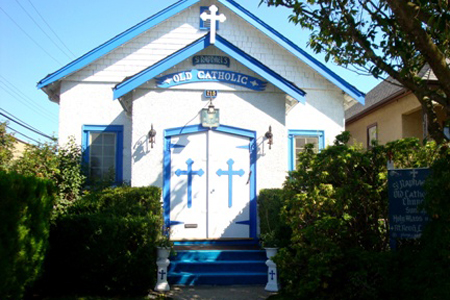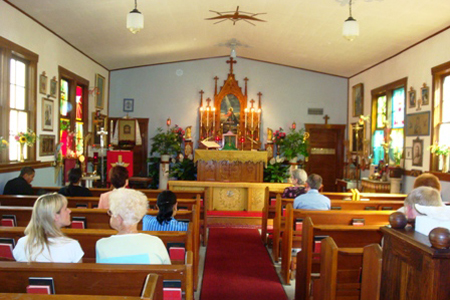| |
 |
 |
 |
| Comment on this report, or find other reports. |
 |
| Our Mystery Worshippers are volunteers who warm church pews for us around the world. If you'd like to become a Mystery Worshipper, start here. |
 |
| Find out how to reproduce this report in your church magazine or website. |
|
|
| 2046: St Raphael's, Vancouver, British Columbia, Canada |
 |
 |
 |
Mystery Worshipper: LQ.
The church:
St Raphael's, Vancouver, British Columbia, Canada.
Denomination: Old Catholic Church of British Columbia.
The
building: St Raphel's is a pretty
little white clapboard church, trimmed in bright blue, on a
residential street corner. It has a single bell on the roof,
like an old-fashioned schoolhouse, topped by a cross. Inside,
the chapel is filled with votive artwork, including stations
of the cross, paintings, icons, and statues. A traditional high
altar, adorned with an electric "big six" set of candles
and artificial flowers, stands against the east wall.
The church:
St Raphael's began in 1934 as an independent Liberal Catholic
community, but separated from that movement in 1975. It continues
to use a liturgy similar to the Liberal Catholic "mystical mass",
which has a number of distinctive features (see below). The
church held probationary membership in the Union of Utrecht
(which is in full communion with the Anglican Church) from 2006
to 2007, but left following a difference of opinion. St Raphael's
is a parish of the poor: its clergy receive no stipend and rely
on self-support and donations. Celibacy is optional. Today the
church continues its mission to the needy, providing food handouts
for people who come to the door hungry, and funerals for those
who have nobody to mourn them. It offers a traditional Catholic
community of worship with all the sacraments for all the baptised.
The neighbourhood:
The church is in a residential and commercial neighbourhood
on the south-east side of Vancouver, steps away from an arterial
road lined with specialty shops catering mainly to the local
South Asian community. As well as a big Punjabi market, there
are shops and homes belonging to Chinese, Korean, Vietnamese
and Filipino-Canadians. The area has also been home to a Mennonite
community for generations.
The cast:
The Rt Revd Jürgen Schmode, bishop, was the principal celebrant,
with the Revd Martin Lotho concelebrating. Bishop Schmode was
formerly a pastor in the United Church of Christ in Germany
and then the Evangelical Lutheran Church in Canada.
The date & time:
Assumption of the Blessed Virgin Mary, 15 August 2010, 11.00am.
What was the name of the service?
Holy Mass (a low mass).
How full was the building?
The small space was impressively, though not uncomfortably, full.
Did anyone welcome you personally?
Parishioners outside welcomed us, told us when mass would begin, and invited us to take photographs.
Was your pew comfortable?
Very much so. The kneeler was padded – but not too softly – and at an ideal angle for the back-preserving "Anglican crouch".
How would you describe the pre-service
atmosphere?
The church began to fill early. The website advertises a recitation
of the rosary before mass, but perhaps we arrived too late.
Recorded music of a blandly devotional character was playing.
What were the exact opening words of the
service?
"In the Name of the Father, and of the Son, and of the Holy Spirit."
What books did the congregation use during the
service?
Liturgy of the Holy Eucharist, published in English and French by the Old Catholic Church in 1983. The Hymn Book of the Anglican Church of Canada
and the United Church of Canada (1971), was in the pews, but is not used during the summer.
What musical instruments were played?
Recorded music was provided before and after mass, with a recording
of Gregorian chant interspersed with change-ringing during communion.

Did anything distract you?
It was hard not to be distracted, in a good way, by the many
devotional ornaments in the chancel.
Was the worship stiff-upper-lip, happy clappy, or
what?
The liturgy was an attenuated version of the Tridentine mass,
modified to lay less emphasis on penitential elements and greater
on celebratory ones. The Gloria in excelsis Deo is
shorter and has distinctive passages about the love between
God and humanity. There are fewer variable parts to the mass:
general psalms of praise are used at the introit and gradual.
The first verse of the hymn "Adore te devote"
was said as a memorial acclamation (the better-known Liberal
Rite has "O come all ye faithful"). The traditional
prayer "I believe, Lord, and I confess", said by communicants
in the Orthodox Church, preceded communion, but the Filioque
was retained. After saying the Lord's Prayer in English and
French, members of the congregation repeated it in their many
native tongues one after another. The bishop intincted the host
for each communicant, laying it on the tongue as Father Martin
stood by holding a paten. The bishop used a crucifix in giving
the absolution and final blessing. The Latin dismissal: "Ite,
missa est" was given. Regrettably, we did not find
ourselves at St Raphael's on a second Sunday of the month, when
the service of Benediction of the Blessed Sacrament in its expanded
Liberal Catholic form follows mass.
Exactly how long was the sermon?
5 minutes.
On a scale of 1-10, how
good was the preacher?
8 – The bishop pointed to the children in the congregation,
and noted that they are especially welcome and he was not worried
they would drown out his impressive bass-baritone voice.
In a nutshell, what was
the sermon about?
We all do well to look to the example of children, who simply
know on faith that they belong to God and that the Church will
be there to care for them. Their trust in God is a model for
us. As it was a hot day, the bishop concluded by announcing
that we would say just a decade of the rosary in commemoration
of the Assumption of the Blessed Virgin Mary, which feast day
it was.
Which part of the service was like being in
heaven?
The joyful recitation of the Hail Mary during the rosary.
And which part was like being in... er... the other place?
I was sorry that the sprinkling of holy water at the beginning
of mass was done with a stationary backward glance. I did not
get "hit."
What happened when you hung around after the service looking lost?
The congregation queued up behind the recessional to greet the
clergy.
How would you describe the after-service
coffee?
Loaves of bread were distributed, that none go hungry during
the week.
How would you feel about making this church your regular (where 10 = ecstatic, 0 = terminal)?
9 – I would certainly want to visit some of the many other
church attractions in Vancouver if I lived here, but I imagine
that I would keep coming back.
Did the service make you feel glad to be a
Christian?
It certainly did. As we departed, a member of my party remarked that it would be in communities like St Raphael's that the church will survive.
What one thing will you remember about all this in seven days' time?
The spontaneous enthusiasm of the rosary. |
|
|
 |
 |
 |
| We rely on voluntary donations to stay online. If you're a regular visitor to Ship of Fools, please consider supporting us. |
 |
 |
 |
| The Mystery Pilgrim |
 |
| One of our most seasoned reporters makes the Camino pilgrimage to Santiago de Compostela in Spain. Read here. |
 |
 |
 |
| London churches |
 |
| Read reports from 70 London churches, visited by a small army of Mystery Worshippers on one single Sunday. Read here. |
| |
|
|
|
|


